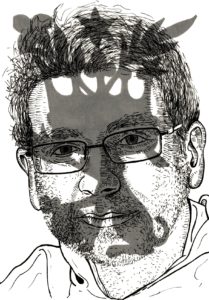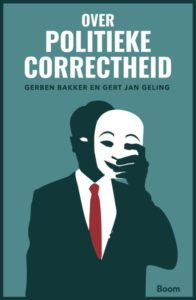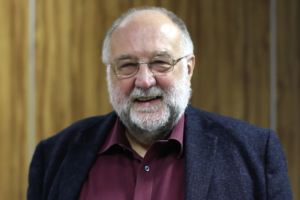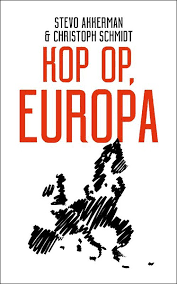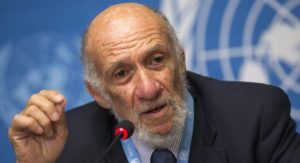
Richard Anderson Falk- Professor of International Law Emeritus
Based on lecture given at West Chester University, October 24, 2018.
The title requires a few words of explanation. By the ‘Age of Trump,’ I mean not only the current American president. The phrase is meant to encompass elected leaders like him around the world. I have a friend in India who refers to Narendra Modi as ‘our Trump’ and the newspapers have been full of commentary to the effect that the new leader of Brazil, Jair Bolsonaro, amounts to ‘a Brazilian Donald Trump,’ although some familiar with Bolsonaro’s worldview insist that ‘a Brazilian Joseph Goebbels’ is more accurate. This extension of Trump to Trumpism is meant to make us aware that Trump is not just an American abnormality. He reflects a structural conditions that seem global in character, although with significant variations from nation to nation.[i]
By referring to ‘Trumpism’ my intention to highlight several issues beyond this autocratic brand of ‘democratic’ leader:
(1) To associate ‘Trumpism’ with a deliberate U.S. withdrawal from political and neoliberal globalization, without significantly challenging, perhaps even augmenting military globalism, enhancing capabilities to project destructive power anywhere on the planet, while weakening alliance commitments and multilateral trade frameworks;
(2) Trumpism also refers to the populist base of support for a global array of strong leaders, and their accompanying right-wing social, economic, and cultural policies, with the threat of ‘fascism’ and fascist tendencies being increasingly feared and perceived, even in centrist discourse;
(3) Trumpism also involves a shift of preferred worldview from globalist to nationalist centers of political gravity, with a loss of normative support for human rights, democracy, and multilateral diplomacy and cooperative forms of multilateral problem-solving and treaty making; and
(4) in the American setting, this phenomenon of Trumpism is not tied solely to the person of Trump; it could survive Trump if one or more of several scenarios unfold—for instance, in the 2018 and 2020 national elections the Republican Congress is reelected, even if Trump should be defeated or compelled to resign—in effect, the Republican Party has been effectively taken over by the ideas, values, and approach of Trump, and vice versa; it is difficult to disentangle ideological cause and effect as between party and leader.
The Kavanaugh confirmation hearings were one kind of straw in the wind, considering the iron party discipline manifested, and suggesting that the American judiciary will be Trumpist for many years even if Trump is defeated. Trump’s judicial appointments would set the judicial tone for years, if not decades, were the Democratic Party to take control of the Senate as early as November.
There is one important confusion surround the global approach of Trump, which arises from the perception of Trump as incoherent, impulsive, and dishonest, and nothing more than an opportunistic narcissist. I think this confusion can be exposed by distinguishing between Trump as tactician and Trump as strategist. It is as if it is necessary to approach the identity of Trump as an either/or question: either Trump is completely ad hoc and opportunistic or he knows what he is doing, and has been effective in carrying out his plan. My view is that Trump is both an erratic personality and a right-wing ideologue.
To simply a rather complex set of questions let me suggest that when Trump acts tactically, or in dealing with the media, he is inconsistent, often lies, bobs and weaves like a professional boxer. He seems capable of being starkly contradictory without blinking, and above all, adopt positions that are both tasteless and detached from reality, as well as being supremely opportunistic, especially if he feels cornered by breaking news or is intent on capturing the news cycle. In such contexts, Trump seems ready to keep changing his story, retract compromises, defame the opposition, inflame his base by uttering deliberate exaggerations, and steer the ship of state with wild abandon without the steadying presence of a rudder.
However, when Trump acts strategically he seems quite a different person, above all, rather coherent, and methodical, almost pragmatic, in advancing an ideological agenda. His grand strategy is consistently reactionary in the sense of being ultra-nationalist, anti-immigrant, anti-globalist, militarist, business friendly, and contemptuous of international law, the UN, human rights, constitutionalism, the rule of law, climate change, and environmental protection. Trump continues to be an avowed climate changer denier in the face of massive scientific evidence to the contrary and despite a series of daunting extreme weather events here in the United States. ‘America, First’ is Trump’s signature slogan. For once, it is not ‘fake news,’ although it strikes many of us as imprudent and unacceptable in shaping American public policy. This kind of egocentric nationalism and unfettered capitalism is dangerously ill-adapted to serve as a geopolitical and economic compass for successfully navigating the 21st century.
To obtain a more complete picture of Trump’s political style, it seems illuminating to make an assessment by combining perceptions from three different angles: as a trickster and con man when tweeting or dealing with the media; as a demagogue when he performs at his political rallies; and as an ideologue when it comes to policy decisions and influence peddling. It is this composite that makes Trump such a confounding and dangerous political figure. It also makes the past political experience of American presidents irrelevant. It is not an overstatement to observe that there has never before been an American president who handles the office in such a maverick fashion.
Normative Decline: As someone who has long associated his work with the critical tradition of International Relations (IR) theorizing, I am particularly sensitive to an observable normative decline in international behavior that can be partially attributed to Trump and Trumpism. For one thing, the US has acted as global leader, including as advocate of public goods, ever since 1945. Admittedly its record and practice has been mixed when it comes to international law and respect for the UN and its Charter. Nevertheless, the pre-Trump leadership role was vital in several key sectors of global policy, including climate change, nuclear arms control, development assistance, world poverty, and global migration. The United States Government was also a vital promoter of several less visible concerns such as negotiating a modern public order of the oceans, an international regime for Antarctica, and an international framework of rules, procedures, and institutions for trade and investment. There is no doubt that the U.S. carried out its leadership role so as to gain advantages for itself, but this was generally accepted by most other states because the U.S. contributed to policy results that were widely believed to be upholding the common interests of humanity. Without this American role, there has emerged a leadership vacuum at the very time that the world order challenges can be met only with a strong and constructive exertion of leadership on global issues. The UN is incapable of providing such leadership. World order remains state-centric and is as dependent as ever on global leadership by dominant sovereign states. It is quite possible that some post-American form of collective leadership will emerge, and provide the world with an inter-governmental alternative to global governance under the watchful eye of Washington.
What Trump has done, and Trumpism endorsed, is to repudiate these normative horizons in global settings in a variety of contexts in which their relevance should be treated as greater than ever. Such behavior increases risks of catastrophic ecological and geopolitical events, ranging from accelerated global warming to a war with Iran. It also exhibits a kind of escapist evasion of the real challenges to national and global wellbeing that will grow more serious and impose ever higher costs on the future to the extent that they are being currently ignored. Furthermore, leaving these issues to simmer, accentuates the existential suffering of persons subject to cruel and oppressive conditions of strife and control, while consigning future generations to a dark destiny and heightened risks of catastrophic events.
By indicting the role of Trump and Trumpism I do not want leave the impression of a rosy picture of pre-Trump world order. In actuality, Trump has so far when acting internationally, except for global economic policy, mainly departed from the pre-Trump policy framework discursive level. To date the behavioral discontinuities are not clearly evident. Trump has definitely made moves to dismantle the international political economy, or what is referred to as ‘the liberal world order’ shaped after 1945, with its deference to the approaches taken by the Bretton Woods Institutions of the World Bank and IMF. Yet the Trump approach does not want to regulate capital flows beyond protecting the domestic American market. It has no trouble with an outlook that favors returns on capital over effects on people.
On other issues, as well, it is well to look back so as to gain insight into what has changed, and what has remained essentially the same. Pre-Trump foreign policy was steadfastly pro-Israeli all along, its idea of national security all along aspired to achieve global military and economic dominance, and Washington’s approach to the UN, international law, and human rights was always highly selective, and often subordinated to the pursuit of strategic goals. This was especially true after the end of the Cold War. During this period of 25 years pre-Trump leaders completely missed golden opportunities to improve the quality of world order by strengthening the UN, by seeking nuclear disarmament, by pursuing ecological stability, and by promoting global economic reforms that would ensure a more equitable societal sharing of the benefits of economic growth. It did none of these things, thus paving the way for the rise of Trump and Trumpism, which has to be sure intensified these regressive tendencies that preceded its occupancy of the White House. In this sense, it is a mistake of mainstream critics not to place significant levels of blame for Trump and Trumpism on the myopic priorities of pre-Trump global leadership. [See Stephen Gill, ed.,Global Crises and the Crisis of Global Leadership (2012)] It is a reasonable conjecture that had the pre-Trump leaders taken advantage of the situation after the end of the Cold War to promote an ambitious program of global reform, there might never have been an ‘Age of Trump,’ but of course we will never know.
The claimed reality of normative decline can be better understood by looking at three illustrative instances both to understand and appraise the claim.
Ignoring Palestinian Rights.
One of the clearest instances of Trump’s approach in action concerns the approach to the Palestinian struggle for national rights. Trump’s one-sided moves over the past two years are indicative: appointing extreme Zionists to shape his policies toward Israel and Palestine, and even the region; Trump’s break with the international consensus by moving the American embassy in Israel to Jerusalem; a blind eye toward unlawful Israel settlement expansion and its repeated use of excessive force and collective punishment; the defunding of UNRWA assistance to administer occupied Palestinian territories accentuating the ordeal endured by the civilian populations, especially in Gaza; and the attempts to deny refugee status to several million Palestinian refugees born in refugee camps.
These provocative policy initiatives appear to be part of a coherent endorsement of a ‘one-state Israeli solution,’ a feature of which is to deny completely Palestinian fundamental rights, including above all the right of self-determination. Along the way Trump and his minions bashes the UN for its supposedly anti-Israel bias and go so far as to threaten UN member states and the Organization with funding consequences if American policy demands are being ignored. It should be understood that Israel and the United States are complaining about UN criticisms of Israeli policies that are flagrant violations of international humanitarian law and international criminal law.[ii]
Such geopolitical bullying at the UN is a total repudiation of the potential for creating a cooperative international order, which would alone be capable of serving the shared interests of the entire world. These interests include those challenges of global scope that no sovereign state, no matter how rich and powerful can hope to solve on its own. These bullying moves by the U.S. are also a shocking response to efforts at the UN to hold Israel accountable for flagrant violations of international law.
This in turn has enabled Israel to proceed ruthlessly with the last phases of the Zionist Project in its maximal form, which is to establish an exclusive Jewish state on the entirety of what had long been an essentially non-Jewish society. It is helpful to recall that at the time in 1917 when this Zionist Project received its first major international blessing in the form of the Balfour Declaration the Jewish population of Palestine was less than 6%. The repression and dispossession of non-Jewish residents that has followed for more than a century rips away the veil of deception surrounding the claim that Israel was the only democratic state in the Middle East. It gave a measure of plausibility to allegations of the apartheid nature of Israeli domination of the Palestinian people. This allegation has now been made less controversial due to the recent adoption in Israel of a new Basic Law known as “The Nation Staten Law of the Jewish people.” Despite the realities of the subjugation of Palestinians, prior to the Basic Law, the United States had joined Israel in insisting at the UN that an academic report concluding that the patterns and practices relied upon by Israel qualified as apartheid was nothing other than a crude attempt to slander Israel via an anti-Semitic trope.[iii]
My point here is to take account of a clear and prominent international situation in which American political partisanship is allowed to push aside normative considerations. To do this in such a high-profile setting, further diminishes respect for the rights of a dispossessed and oppressed people and for international law and the UN generally.
The Qatar Crisis.
The Qatar Crisis, which began in 2017, illustrates the tactical side of Trump as ill-informed and mercurial when it comes to American foreign policy and is again confirmatory of the irrelevance of international law if its application is inconvenient in geopolitical crisis situations. In the immediate aftermath of Trump’s 2017 May visit to Saudi Arabia, with its purpose of strengthening of the Saudi/Israel/US resolve to confront Iran, the Mohammed ben Salmon leadership in Riyadh chose the moment to confront the tiny state of Qatar with 13 Demands, coupled with a variety of threats as a prelude to coercive diplomacy in the form of a blockade, an embargo, and expulsion of Qatari nationals from residence and employment throughout the Gulf region.
The central charge against Qatar was its alleged support for terrorists and terrorism in the region. This was a perverse charge because the Gulf Coalition making the allegations was far more indictable for supporting international terrorism and promoting jihadism than was Qatar. The real motivation of the anti-Qatar coalition was to shut down Al Jazeera and the policies of asylum that Qatar extended to political figures seeking refuge, initiatives well within Qatar’s sovereign rights, and steps that were actually supportive of internationally protected human rights and political pluralism.
In actuality, these countries seeking to overwhelm Qatar were more worried about democratic tendencies than they were about terrorism. Their Sunni governments are extremely hostile to all Muslim oriented political tendencies in the region in ways that are regarded as more threatening to their stability than is the Shi’ia sectarian rivalry. This form of threat perception was made clear by the counterrevolutionary support given by the Gulf monarchies to the military coup against the democratically elected Muslim Brotherhood government in Egypt back in 2013. The hostility toward Shi’ism is less theological than geopolitical, a cover for its competition with Iran for regional hegemony.
At first, Trump conveyed unreserved U.S. support for these moves against Qater designed to intimate this tiny country. However it became soon clear that Trump had no idea about what he was doing. Upon returning to the U.S. Trump quickly discovered that the largest American air base in the region was located inside Qatar housing as many as 10,000 American troops. In an unexplained turnaround Trump dropped support for confronting Qatar and urged the parties to resolve the Gulf Crisis as soon as possible by negotiations, a position supported strongly by the Secretaries of State and Defense. After some months, when this shift of Washington tactics didn’t succeed, Trump shifted again this time asserting that the U.S. does not interfere in such crises, and left it up to the parties to find their own solution. I suspect that this second shift occurred because the Trump presidency didn’t want to be associated with a position that appeared to exert no influence on the parties to the conflict.
My central point is that what didn’t matter at all in such a tactical situation was the striking fact that Qatar, as with Palestine, had international law totally on its side with respect to all of the issues in contention. Even the international community and the UN failed to lend symbolic support to Qatar in reaction to the unlawful bullying tactics pursued by Saudi Arabia and its coalition partners. Qatar has seemed reluctant to insist on its rights under international law as its pragmatic response to the crisis was to seek a mediated compromise rather than an acknowledgement of wrongdoing by the Gulf Coalition. Perhaps such a posture was, and remains, a reflection of the power disparities, which meant that Qatar’s only hope to end the crisis peacefully. Expecting the Gulf Coalition to admit its wrongdoing was evidently assumed to be unrealistic given its hard power dominance of the Gulf.
The Khashoggi Murder.
As has been widely suggested, the grotesque murder of the leading Saudi journalist, Kamal Khashoggi, shocked humanity in ways that tens of thousand of dead civilians in Yemen and Syria have not. There are various interpretations and piously phrased prescriptions about what must be done. Should the Saudi perpetrators be held responsible? And if so how? Should lucrative arms deals benefitting the American arms industry be cancelled costing American jobs and profits? Should the alliance with Saudi Arabia by the US and Israel go forward with its central plan of confronting Iran, while abandoning the Palestinians? What such a litany of questions ignores is the total neglect of the relevance of the most fundamental of human rights, the right to life, as well as the abuse of diplomatic immunity of consulates located in a foreign territory.
When contemplating the proper course of action the main consideration seems to be ‘how to preserve national interests in light of the murder?’ Trump and the Israeli leadership sought to explain away the Khashoggi murder by shamelessly advancing a series of scenarios that invoked ‘alternative facts’ to avoid pointing a finger of accusation in the direction of Riyadh—first, it didn’t happen, and if it happened it was an accident, and then finally, if it wasn’t accident it was not premeditated, and should be treated as a rogue operation of Saudi security people going beyond their orders. If some Saudis are punished this is enough to absolve Mohamed ben Salmon from guilt, regional geopolitics after a pause can be resumed as if the murder didn’t happen, and the United States can deliver the arms sold with a clear conscience as if nothing happened that should raise questions about continuing to treat Saudi Arabia as a valued ally. Not just the Khashoggi murder, but the broader record of human rights abuse and the major funding of Islamic militancy around the world should have caused severe doubt. Does not political realism have any outer moral limits? The alliance with Saudi Arabia carries cynicism about ethical decency to an extreme.
Taking World Order Seriously.
Leaders like Trump or Netanyahu whose global outlook are antagonistic to the values of the UN Charter and some form of humane global governance. Yet even they appear to value the UN as a prime time arena within which to articulate their preferred futures and aspirations, ironically including attacking the UN because it does behave as they would wish. In this sense, the priorities and values of leaders, especially those of authoritarian disposition, are often displayed in the annual series of speeches given at the UN. The media pays little attention to such presentations except to gain clues about immediate policy concerns, and this preoccupation with hot button issues overlooks their value as expressive of the worldview professed by current national leaders. This is not to suggest that such UN statements ignore immediate policy choices. The point is rather that it is more valuable to treat these annual statements as meaningful disclosures of underlying ideas about the nature and dynamics of world order.
Donald Trump’s second UN speech was somewhat less belligerent than his 2017 speech, except with reference to Iran, which was threatening, misleading, and in violation of spirit and letter of UN Charter. Trump disturbingly conveyed a clear sense that recourse to war, at least for the US was discretionary, and need not necessarily be justified by advancing a credible claim of self-defense or even a reasoned justification. As such, without using negating language toward the relevance of international law, Trump is repudiating in form as well as practice the core undertaking of the UN to prohibit all aggressive threats and uses of force in international relations.
In articulating this conception of the world according to Trump a few quotations underscore the tone and substance of his outlook, especially his insistence on subordinating global concerns to national interests narrowly conceived. On all questions, Trump accords priority to sovereign political will, thus repudiating the central efforts after World War II to promote a global rule of law and impose standards of criminal accountability on those who act on behalf of sovereign states. He also rejects the role of the UN Charter and international law as the rightful arbiter of when a state is authorized to use force internationally in situations other than responses to armed attacks.
On Anti-Globalism:
“America will always choose independence and cooperation over global governance, control and dominance.”
On Affirming Capitalism as the only legitimate path:
“America is governed by Americans. We reject the ideology of globalism, and we embrace the doctrine of patriotism.”
“All nations around the world should resist socialism and the misery that it brings.”
On UN Reform:
Denying the legitimacy to both HRC and ICC:
“We will never surrender America’s sovereignty to an unelected, unaccountable global bureaucracy.”
On a World of Sovereign States:
“Sovereign and independent nations are the only vehicle where freedom has ever survived, democracy, has ever endured or peace has ever prospered. And we must protect our sovereignty and our cherished independence above all,”
“So let us choose a future of patriotism, prosperity, and pride…We have a policy of principled realism rooted in shared goals, interests, and values.”
Dr. Mahathir Mohamed, the 93 year old leader of Malaysia gave the UN General Assembly an entirely different view of both the national interests of his country and his view of the global setting. This view reaffirmed the balance struck between the global and the national in the post-1945 initiatives as enacted by establishing the UN and holding the Nuremberg war crimes trials. Mahathir also recognized the gravity of the challenges that are presently confronting humanity. In my view, Mahathir’s responsible statesmanship contrasts with Trump’s anachronistic ideas of international order and American national interests.
On Malaysian national interest and values:
“Malaysians want a new Malaysia that upholds the principles of fairness, good governance, integrity and the rule of law. They want a Malaysia that is a friend to all and enemy of none. A Malaysia that remains neutral and non-aligned. A Malaysia that detests and abhors wars and violence. They also want a Malaysia that will speak its mind on what is right and wrong, without fear or favour. A new Malaysia that believes in co-operation based on mutual respect, for mutual gain. The new Malaysia that offers a partnership based on our philosophy of ‘prosper-thy-neighbour’. We believe in the goodness of cooperation, that a prosperous and stable neighbour would contribute to our own prosperity and stability.”
On respect for UN principles:
“These include the principles of truth, human rights, the rule of law, justice, fairness, responsibility and accountability, as well as sustainability.”
Toward a nonviolent geopolitics:
“There is something wrong with our way of thinking, with our value system. Kill one man, it is murder, kill a million and you become a hero. And so we still believe that conflict between nations can be resolved with war.”
On UN Reform:
“Malaysia lauds the UN in its endeavours to end poverty, protect our planet and try to ensure everyone enjoys peace and prosperity. But I would like to refer to the need for reform in the organisation. Five countries on the basis of their victories 70 over years ago cannot claim to have a right to hold the world to ransom forever. They cannot take the moral high ground, preaching democracy and regime change in the countries of the world when they deny democracy in this organisation.”
These two opposing worldviews should not be viewed as symmetrical. Trump adopts an extreme version of state-centric world order that might have been seen as appropriate for a dominant state in the nineteenth century. In contrast, Mahathir has views that take responsible account of twenty-first century realities, and a more globalized cluster of challenges and opportunities. In this regard, it seems appropriate to regard Trump and Trumpism as dangerously anachronistic, while Mahathir providing an illuminating example of what might be described as ‘the new political realism’ sensitive to the urgencies of the present.
Seven Conclusions:
– It is instructive to distinguish Donald Trump the person from Trumpism a global political phenomenon of right-wing populism and a structural reaction to neoliberal globalization
– It is also clarifying to distinguish Trump the gifted tactical trickster from Trump the right-wing ideologue;
– There has occurred a normative decline rendering irrelevant in most war/peace settings international law, the UN, and human rights; this decline began before the Trump presidency but has been accelerated by Trump;
– It would be misleading to overlook pre-Trump failings of American global leadership, especially in the period between the end of the Cold War and the 9/11 attacks; the pre-Trump continuities are more fundamental than discontinuities, especially in view of the bipartisan response to 9/11;
– Two lines of criticism of Trump’s world order approach should be taken into account: I. blame by the established interests and the deep state for dismantling the liberal international order, damaging Western solidarity, retreating from hegemonic leadership; II. blame by political realists for abandoning the U.S. role as benevolent hegemon; such realist hold Trump responsible for his failure to do more to shape global policy along pragmatic and sustainable lines;
– War-mongering toward Iran;
– It would be in the human interest to be attentive to Mahathir’s alternative worldview, which articulates a perspective sensitive to the claims of small states and responsive to the claims of planetary realism; such an outlook necessarily rejects regressive embraces of ultra-nationalism that are occurring in several key countries at the present time.
Notes:
[i] Based on lecture given at West Chester University, October 24, 2018.
[ii] It is always important to appreciate that the problems of the Palestinian people are a direct result of the failure of the UN to find a formula for peace that upholds Palestinian basic rights. No other situation in the world is so directly related to UN unrealized initiatives.
[iii] This study titled “Israeli Policies and Practices Towards the Palestinian People: The Question of Apartheid”, was commissioned by the UN Economic and Social Council for West Asia (ESCWA), released March 15, 2017, and written by Virginia Tilley and myself.
 Je hebt de traditionele Soennitische islam, de rijks-islam, de islam die zich heeft ontwikkeld binnen de Arabische en Ottomaanse rijken en daar diende als religieuze, wetgevende en spirituele structuur. De rijks-islam wordt vooral als referentiepunt gebruikt door hen die willen aantonen dat de islam vredelievend is. In de 19e eeuw toen het Westen superieur werd, heeft men binnen de islamitische wereld deze islam ervan beschuldigd de oorzaak te zijn van de decadentie. Er ontstonden hervormingsbewegingen die de islam wilden moderniseren, door het seculier en westers te maken, of te moderniseren door terug te gaan naar de bron als mogelijke vernieuwing. In die laatste beweging kwam het salafisme op aan het eind van de 19de eeuw. Onder invloed van het wahabisme, met een zeer strikte interpretatie van de goddelijke uniciteit, stichtten zij in 1932 het huidige Saoedi-Arabië. Zij stelden propaganda-organisaties in, erop gericht om moslims uit de hele wereld te bekeren tot de salafistische opvattingen van de islam. Het leven van alle mensen moet worden geregeld door religieuze voorschriften. Ze zijn overtuigd van een letterlijke opvatting van de koran en verbieden interpretatie van de teksten. Het is sektarisch en beveelt onderwerping aan de autoriteit aan. De terroristische acties komen voor uit de salafistische ideologie.
Je hebt de traditionele Soennitische islam, de rijks-islam, de islam die zich heeft ontwikkeld binnen de Arabische en Ottomaanse rijken en daar diende als religieuze, wetgevende en spirituele structuur. De rijks-islam wordt vooral als referentiepunt gebruikt door hen die willen aantonen dat de islam vredelievend is. In de 19e eeuw toen het Westen superieur werd, heeft men binnen de islamitische wereld deze islam ervan beschuldigd de oorzaak te zijn van de decadentie. Er ontstonden hervormingsbewegingen die de islam wilden moderniseren, door het seculier en westers te maken, of te moderniseren door terug te gaan naar de bron als mogelijke vernieuwing. In die laatste beweging kwam het salafisme op aan het eind van de 19de eeuw. Onder invloed van het wahabisme, met een zeer strikte interpretatie van de goddelijke uniciteit, stichtten zij in 1932 het huidige Saoedi-Arabië. Zij stelden propaganda-organisaties in, erop gericht om moslims uit de hele wereld te bekeren tot de salafistische opvattingen van de islam. Het leven van alle mensen moet worden geregeld door religieuze voorschriften. Ze zijn overtuigd van een letterlijke opvatting van de koran en verbieden interpretatie van de teksten. Het is sektarisch en beveelt onderwerping aan de autoriteit aan. De terroristische acties komen voor uit de salafistische ideologie.